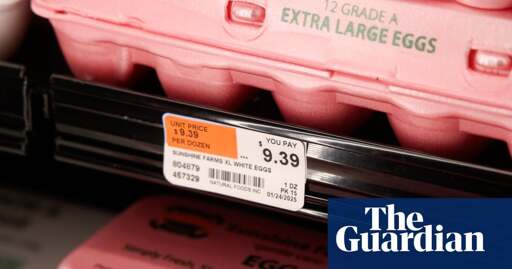Summary
US egg prices are rising due to a severe avian flu outbreak that has killed 14.7 million egg-laying hens since January, surpassing all of 2023’s losses.
Wholesale egg prices have surged, with shortages driving costs as high as $8.35 per dozen in California.
Restaurants and bakeries are struggling with higher costs, while grocery stores try to absorb some of the increase.
The issue has become politically charged as Trump and Republicans blame Biden.



Trump may have actually lowered the price of eggs – albeit not of products in general.
So, he just imposed tariffs on Canada and Mexico. Canada and Mexico stated that they would impose agricultural tariffs in response – not a surprise, as the US is a major agricultural exporter. The list of countertariffed items is not up, but:
https://www.canada.ca/en/department-finance/news/2025/02/canada-announces-155b-tariff-package-in-response-to-unjustified-us-tariffs.html
They don’t explicitly list eggs, but they do list things adjacent to that, and I can believe that eggs might be on the tariff list.
The US runs a trade surplus in eggs.
https://oec.world/en/profile/bilateral-product/eggs/reporter/usa
2022 exports: $549 million, top partner Canada at $77.4 million
2022 imports, $118 million, top partner Canada at $8.19 million.
Trump’s 25% tariffs will tend to reduce the amount of eggs being exported from Canada to the US, which will drive up egg prices in the US.
However, if the Canadian countertariffs – also 25% – have eggs on the list, which we don’t yet know, they will tend to reduce the amount of eggs being exported from the US to Canada, which is about ten times the amount coming the opposite direction. That will tend to drive down egg prices in the US…and one would expect that effect to dominate the effect from reduced egg exports from Canada to the US.
But why is that? Is this one of those tar sands vs sweet crude situations
Over a dozen states have so-called “cage free” laws now, with some states like Colorado only recently having them go into effect as of January 2025.
https://www.ciwf.com/media-and-news/news/2025/01/us-companies-lead-in-cage-free-egg-transition-as-canada-falls-behind
So then the smart move for Canada would be to not put tariffs on eggs, to keep them flowing into Canada and prices in America high?
Canda’s interest is, I expect, to do whatever provides the most political leverage on Trump relative to the cost to Canada. If high egg prices are a cost-effective way to do that, then sure. My guess is that there are a lot of factors that go into that, though.
I would guess that if Canada is doing targeted tariffs – which they stated that they were – that the best things to hit are in swing states (which Presidents have to worry about the most), in politically-influential industries, on products that are very visible to consumers, and in areas where Canada can deal with higher domestic prices relatively-well. Given that a major Trump concern in his first term was the auto industry, was what got the most significant change in the USMCA changes, maybe that. They did list vehicles as one of their targets.
This is assuming, though, that Trump isn’t just aiming to get in the news for having tariffs for a short period of time, declare that his policy was a success and that fentanyl has been dealt with, and then pull the tariffs. If that’s the case, then I wouldn’t expect this to go on for long.